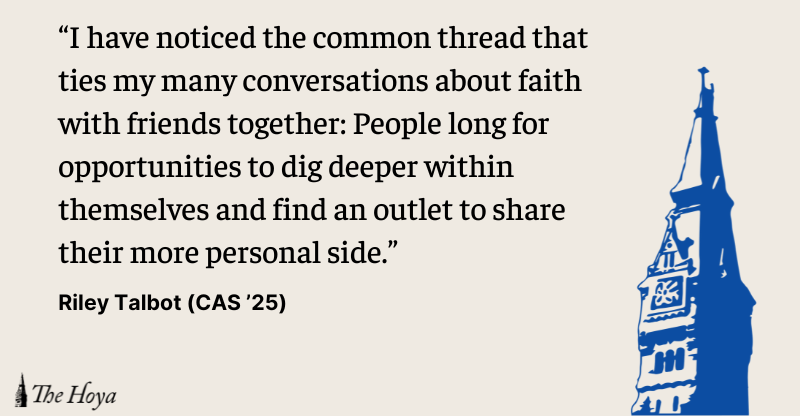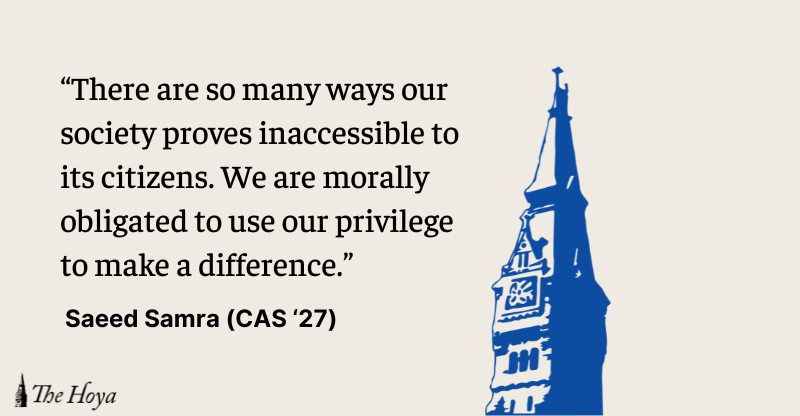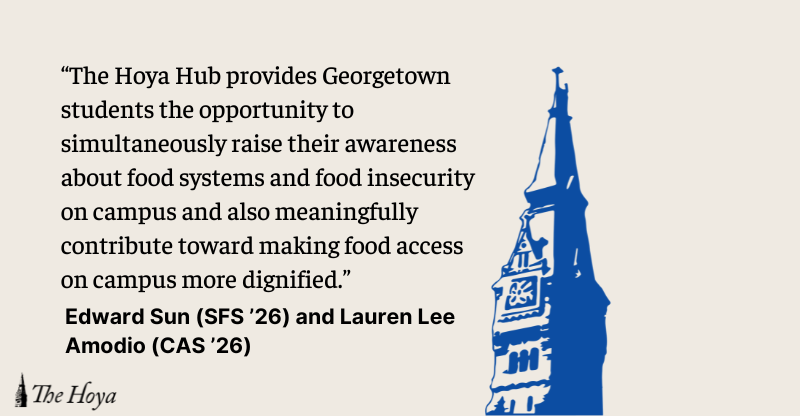As The Hoya’s editorial board noted last week, this summer brought major renovations to O’Donovan Hall. The establishment is now divided between the lower-level Fresh Food Company, which offers unlimited portions, and the upper-level LEO MKT, a collection of restaurant stations. As students bond over the questionable quality of campus food, we must consider the immensely harmful environmental effects of the recent changes and the simple steps that could be taken to remedy them
One of the most notable failures at the redesigned Leo’s is the apparent absence of any clearly marked recycling bins. While freshmen may have trouble identifying crimes against the planet committed by new Leo’s, returning students will notice the unsustainable changes. Next time you find yourself waiting in an endless line at 5Spice, the “Asian-inspired” concept on the upper level, pass the time by looking for the nearest recycling bin. You will be occupied throughout your entire wait because there are no recycling bins upstairs, save for a few lonely bright blue bins with their identifying labels hidden. Inside them, you will find a mix of plastic and food dumped by students who were too lazy to search around. Once you actually get your food, you will find that celebrated symbol that your bowl is, in fact, recyclable. But where can you recycle it?
Even if clearly marked recycling stations were present upstairs, there is simply too much plastic to begin with — significantly more than at old Leo’s, where disposable dishes were rarely used. Now, if you order a side of fruit at Bodega, the concept intended to provide on-the-go options, you will receive a small plastic container in addition to your boxed meal. If you eat there three times a week and always order a side of fruit, you would be throwing out 45 plastic containers in the trash each semester. Plastic does not break down naturally, but if properly recycled it can be reworked into something new. Otherwise, it will sit in a landfill and release toxins into our water, soil and air.
Signs hanging in upstairs Leo’s tout that “All LEO MKT food packing and cutlery is made from recycled (and recyclable) material.” Fantastic, until you remember that all cutlery and plates used last year were reusable, creating no waste at all. While recycled material is great, reusable plates and silverware would be better.
Perhaps students could choose between reusable dishes if they plan to eat at Leo’s or a disposable box if they plan to dine out — like every other dining establishment in the world. The upper level could also implement the system of reusable to-go boxes that is used downstairs; this program could include reusable cups and silverware, and could eliminate the wasteful use of plastic straws, which were not used in old Leo’s.
On the university’s sustainability page, University President John J. DeGioia wrote that Georgetown is “committed to engaging in research as well as teaching and operational practices that address [environmental sustainability] and help us minimize our impact on the environment.” By facilitating such environmentally unfriendly dining practices, the school is failing in its commitment to the student body and to the environment.
There are around 7,500 undergraduates at Georgetown, about half of whom are underclassmen living in dorms without kitchens and who are required to buy meal plans. As such, about 3,750 students eat regularly at Leo’s — not counting the upperclassmen who choose to keep meal plans — and are forced by the school to partake in environmentally detrimental practices.
Leo’s is forcing students to partake in its harmful practices and is entirely misrepresenting itself as a sustainable establishment — Georgetown can no longer justify being bad by being new. We need more recycling bins that are clearly marked. We need to bring back reusable materials upstairs. We need to see less plastic and more composting.
We at Georgetown’s Renewable Energy and Environmental Network are working to spread our message and hopefully improve Leo’s sustainability practices, and we welcome you to join us. Until then, you can try bringing your own reusable containers to the stations upstairs. You can also submit a comment on Hoya Hospitality, the website of the company that manages Leo’s, to express your concerns. We have 10 years on this contract — too long for a high-volume dining hall to continue such grossly unsustainable and wasteful practices. It is up to students to hold the university accountable.
Vivian Cox is a junior in the School of Foreign Service. Austin Hong is a senior in the College. They are members of GREEN, Georgetown’s undergraduate sustainability network.



















